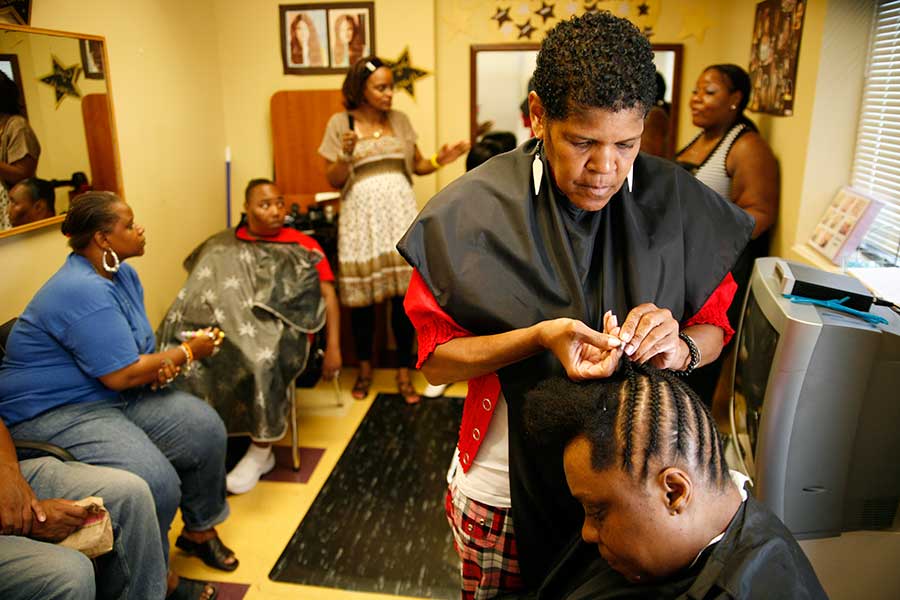“Hollywood Beauty Salon,” screening 7 p.m. Oct. 10 (National Metal Health Day) at International House, is a largely observational documentary about a Germantown program by and for people in recovery for mental-health issues. Gay filmmaker Glenn Holsten chronicles more than a dozen men and women who struggle with depression, bipolar disorder and schizophrenia as they try to live meaningful lives and show — as one subject says — “they are more than just their diagnosis.”
Holsten weaves individual stories of recovery and survival as the various subjects prepare for an annual fashion show. He spoke with PGN to discuss his inspirational film.
PGN: How did you learn about the Hollywood Beauty Salon and come to tell the story?
GH: I work as a freelance filmmaker and one of the nice projects I had was a corporate gig for NHS Human Services, which was the parent company of Hollywood Beauty Salon. They hired me to do a video for their foundation. I saw Rachel (aka “Hollywood”) helping Sanetta (aka “Butterfly”) and they spoke so beautifully about “taking care of their outsides as they took care of their insides.” They touched me and I knew I wanted to come back. That was the genesis.
PGN: Why did you take the approach you did, telling individual stories in between a largely observational narrative?
GH: I am a fan of hybrids: films that go out on a limb and try different things. The film is a total construction. It was designed from a workshop. The objectivity … it was being true to the essence of each person, and doing it in a dignified way that people wouldn’t have access to. Each person in “Hollywood Beauty Salon” shared their story because they are rarely asked to tell their stories outside a clinic. I showed examples and listened a lot. When Crystal says, “I’m a blooming flower,” I had an image of her walking down the street with flowers. Rachel wanted to tell her story of leaving her abusive partner through reenactment. That can be tricky, and expensive, and it doesn’t always pull you into the story. I worked with the animator Paul Fierlinger [to tell her story] and she liked his work. Darlene wanted to tell her younger self that the things that happened in her life weren’t her fault. The idea of casting an actress appealed to her. It was their original inspiration. I was what the mental-health folks call, “The guide on the side.”
PGN: The story of Ed’s flute lesson was an amazing scene.
GH: The flute lesson came after we gave Ed the flute. We approached David Cramer [of the Philadelphia Orchestra] and he agreed to give Ed a lesson in his home. You have films like “Shine” and “The Soloist” that show [genius and madness] and I was taken aback when Ed doesn’t make a flute sound. When he does, it was a beautiful metaphor for recovery.
PGN: How did you identify with these men and women in “Hollywood Beauty Salon”?
GH: My mother suffered from depression and we grew up in a middle-class community that didn’t talk about it. She eventually did see a psychiatrist and he gave her medicine that did help her. I never told my mother how proud I was of her. That gave me a way of tackling a stigma that is so thick in our culture. Rachel was an elegant voice for what I wanted to say. She was all for doing the film. She and all the subjects were very brave. I wanted to honor their fierceness. Film is great for sharing what a lived experience is like, especially for folks with a disability. I cheered them on and they led me to their stories.
PGN: Crystal, one of the film’s subjects, has a very powerful line when she says, “See me for who I am, and not for who you think I am.” What can you say about how your film breaks stereotypes about the mentally ill?
GH: One of my goals was to talk about people, and what connects us, to make entry points into viewers. I dwell on love and family and friendship and independence and food. I feel all the film is trying to do is show that we are connected, so audience members respond to these people and shift their ideas about mental health and illness. You are cheering for them by the end.
PGN: Did you have the ladies do your hair?
GH: I always told Paul [one of the guys in the salon who shaved folks] that he could do my hair. They have ideas about my hair. It’s longer now and they feel strongly about it. That wig supermarket was great. It was great to go into that store that life wouldn’t have brought me into otherwise.
Glenn Holsten and various subjects from “Hollywood Beauty Salon” will be in attendance for a post-screening Q&A Oct. 10 at International House Philadelphia, 3701 Chestnut St. For more information, visit www.ihousephilly.com.

